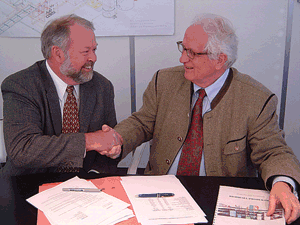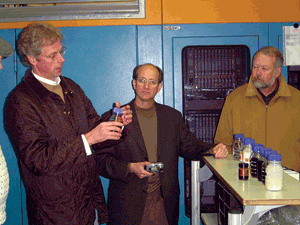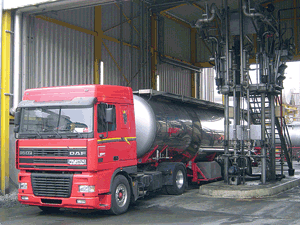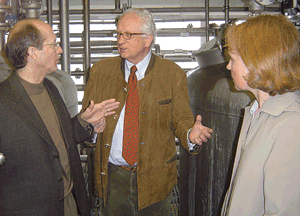German Technology, American Fuel





May 1, 2004
BY Tom Bryan
It was an international business deal with a distinct American touch.
A Midwest venture capital firm reaches an agreement with a German engineering company in early April; the deal involves a long-term plan that could potentially encompass the construction of several large-scale biodiesel plants in North America. Just weeks after the deal is struck, the German team arrives in Pekin, Ill., for an imperative meeting with their American counterparts.
The first matter at hand? A night at the ballpark, of course.
"We're all going to the Peoria Chiefs' home opener," said Biodiesel Systems LLC President and CEO Bruce Davis, speaking with Biodiesel Magazine just days after his company inked a major licensing agreement with western Germany's Agrar Technik (AT).
Davis is spearheading the limited liability corporation's plans to eventually build several plants nationwide. The CEO is as ambitious as he is optimistic about the burgeoning U.S. biodiesel market. He is a straight-talking entrepreneur-and a guy especially eager to get a biodiesel plant built. At a time when some project developers are waiting on the outcome of pending U.S. energy legislation, Biodiesel Systems is getting in the game as soon as it can. Financing a project is the company's last big hurdle, and Davis is relentlessly trying to make that happen.
"We're not waiting for any signals," he said. "We're launching a proven technology that will work under current circumstances [in the United States]. In business, you have to live in the now."
Living in the now means Biodiesel Systems will build its first biodiesel plant with or without favorable federal incentives. Davis and his financial partners believe there is a growing need for clean, renewable fuel in America, and they're betting millions that consumers will turn to biodiesel. The Madison, Wis.-based company has assembled an experienced management and development team, while garnering a great deal of private and public support. The company has partnered with one of Europe's leading process technology providers in AT, which has provided the process technology for more than a dozen plants in Germany, Poland and Spain.
Biodiesel Systems was formed two years ago by a group of venture capitalists based in Madison, whose core strategy is to hunt for new and emerging technologies to invest in. The firm has had its sights set on biodiesel for a couple of years.
"Biodiesel production was an opportunity that we've been eyeing for some time," Davis said. "We saw the success European companies were having with it. We investigated it thoroughly. We explored the feasibility of production and, after much consideration, we ultimately sought out what we believe is the best biodiesel process technology in the world."
Davis, of course, is referring to his company's licensing agreement with AT, the parent company of German-based Campa Biodiesel, which, with its subsidiaries, represents Europe's second largest biodiesel producer. AT and Campa are respectively run by Hans Joachim Gaede and Moritz Gaede, the latter of which also heads the European Biodiesel Board.
"Believe me, we looked around," Davis said. "We performed our due diligence, and we feel fortunate to have been introduced to Agrar Technik."
Why is Davis excited about the AT process? As he explained, AT has a proven technology with demonstrated reliability, flexibility and "scalability" that Biodiesel Systems finds attractive.
"Look, I'm a little bit of an older guy," he said. "I have experience with what works and what doesn't work. This works."
Davis said his company's plan is simple: take a proven European biodiesel production technology and, over a period of several years, build multiple plants. How will they get it all done? By assembling what he calls "the best team possible." The kicker-no one else in the United States will be using the AT process.
"I believe we have the world's premiere process technology," Davis said.
Gaede's feelings about Biodiesel Systems are mutual.
The German company entered into the partnership because it was seeking to broaden the use of its technology and expand into markets outside Europe, especially in the United States. The company wanted an American partner willing to make a long-term commitment. AT was also looking for a company that would work on the enhancement of its process technology while developing new applications for it. Perhaps most importantly, AT wanted a partner that was able and willing to build multiple plants over time.
According to Hans Joachim Gaede, Biodiesel Systems was a perfect match. Gaede, an experienced and cordial company leader, told Biodiesel Magazine that it has been "a great honor" to enter into an agreement with the American firm.
In early April, Davis and his team took a trip (one of many over the last few years) to Germany to meet with AT before finalizing the licensing agreement.
"Our agreement actually developed far in advance of the trip, but we finalized the paperwork while we were there," Davis explained.
Over the course of two years, Davis and his team have toured biodiesel plants in Europe on multiple occasions, seeing both new, highly-integrated facilities and older plants. The opportunity to see both new and old plants gave them an idea of how AT designs hold up, and how the technology evolves, over time.
"It was valuable to see the design in an older condition," he said. "We saw the whole spectrum, from early to mature. These plants mature well. They actually gain efficiencies over time as the technology advances."
With a commitment from AT, Biodiesel System's next big challenge was securing a site for its first plant. After an analysis of several locations, an 18-acre tract in Pekin's Riverway Business Park was its top pick. Davis and his team are excited about the site.
"It's just a darn good location," Davis said. "It's got the availability of raw materials, and the infrastructure we need. In addition, the community has embraced us. They have ethanol [plant] neighbors already, and they know we will be an excellent addition to the park."
A group of about 70 individual investors own shares in the project, which will eventually be known as Illinois Biodiesel Company-Pekin LLC, a subsidiary of Biodiesel Systems. The investor group includes soybean growers representing over 40,000 acres of cultivated land (mostly in Illinois). Most of its investors are Wisconsin and Illinois residents, Davis said, but investors from several other states are also involved.
"Pekin is a great location given the city's support for this development, its proximity to soybean crushing facilities, its access to a multi-modal transportation network, and various state incentives that focus on biodiesel development," said David Anderson, government relations director for Ruder Ware, the Wausau, Wis.-based law firm representing the project.
In fact, the site offers multiple input and output options. It is adjacent to a new rail spur, has excellent highway access and is in close proximity to a five-lane beltline freeway being built around Pekin.
"In terms of transportation infrastructure the site is nearly perfect," Davis said, adding that the site is one-half mile southeast of the Illinois River. "Using the river is a possibility for us. And it was an option we wanted to have."
The site is designed to be well landscaped and "visually attractive." That's important to Davis and his team. "We believe that it's important to perpetuate the same image with your property and facility that you are creating with biodiesel-clean fuel being produced at a clean, nicely designed plant. That way, it's really a company the community can be proud of."
In fact, the city of Pekin is enthusiastically supporting the project.
"This area went through tough times," said Dennis Kief, Pekin city manager. "We had a high unemployment rate for some time. Today, however, it's been developed through grants; the ethanol plants here have been a big part of our success. We have two [ethanol] plants that are both good neighbors, and compared to ethanol production, a biodiesel plant would be a piece of the cake. It's a perfect fit. Not to mention that it would be a godsend to the soybean growers in the area. I think it's simply a win-win situation for everybody."
If built, the plant would be located in "the heart of soybean country." Soybean oil is, in fact, Biodiesel System's feedstock of choice, although the AT process technology is multi-feedstock oriented.
"It's a process that provides us with flexibility," Davis told Biodiesel Magazine.
Financing for the project is still in the negotiation stage, but the company is hoping to break ground on the plant this summer. The plant is also eligible for several types of financial assistance and would benefit from the state's biofuels tax incentives approved last year. The plant would be located in a state Enterprise Zone, an economic tool that is applied for by the community.
Because the plant would not include a bean-crushing facility, it would employ just 20 individuals, including plant operators and laboratory staff.
"However, that does not include the substantial amount of indirect jobs that would be created by the construction and operation of the plant," Davis said.
The fuel would be marketed much the same way biodiesel is marketed at many biodiesel plants in Europe, utilizing both in-house marketers and outside firms. Currently, Illinois has one biodiesel manufacturer, Joliet's Stepan Biodiesel, which purchases soy oil on the open market from a variety of sources.
AT would help startup and training but would not manage the facility. The German company would, however, have ultimate oversight on the design and construction of the plant. "They will also help us select and train the right people to run the plant," Davis said. "Anything we can do together on this project, we will attempt."
As soon as financing is secured, AT will help Biodiesel Systems transition the German technology to U.S. standards and local codes.
With financing efforts still underway, Davis and the others are remaining optimistic that they will have the plant on line in 2005.
"We are confident and perfectly positioned," he said. "The ball is rolling."
A Midwest venture capital firm reaches an agreement with a German engineering company in early April; the deal involves a long-term plan that could potentially encompass the construction of several large-scale biodiesel plants in North America. Just weeks after the deal is struck, the German team arrives in Pekin, Ill., for an imperative meeting with their American counterparts.
The first matter at hand? A night at the ballpark, of course.
"We're all going to the Peoria Chiefs' home opener," said Biodiesel Systems LLC President and CEO Bruce Davis, speaking with Biodiesel Magazine just days after his company inked a major licensing agreement with western Germany's Agrar Technik (AT).
Davis is spearheading the limited liability corporation's plans to eventually build several plants nationwide. The CEO is as ambitious as he is optimistic about the burgeoning U.S. biodiesel market. He is a straight-talking entrepreneur-and a guy especially eager to get a biodiesel plant built. At a time when some project developers are waiting on the outcome of pending U.S. energy legislation, Biodiesel Systems is getting in the game as soon as it can. Financing a project is the company's last big hurdle, and Davis is relentlessly trying to make that happen.
"We're not waiting for any signals," he said. "We're launching a proven technology that will work under current circumstances [in the United States]. In business, you have to live in the now."
Living in the now means Biodiesel Systems will build its first biodiesel plant with or without favorable federal incentives. Davis and his financial partners believe there is a growing need for clean, renewable fuel in America, and they're betting millions that consumers will turn to biodiesel. The Madison, Wis.-based company has assembled an experienced management and development team, while garnering a great deal of private and public support. The company has partnered with one of Europe's leading process technology providers in AT, which has provided the process technology for more than a dozen plants in Germany, Poland and Spain.
Biodiesel Systems was formed two years ago by a group of venture capitalists based in Madison, whose core strategy is to hunt for new and emerging technologies to invest in. The firm has had its sights set on biodiesel for a couple of years.
"Biodiesel production was an opportunity that we've been eyeing for some time," Davis said. "We saw the success European companies were having with it. We investigated it thoroughly. We explored the feasibility of production and, after much consideration, we ultimately sought out what we believe is the best biodiesel process technology in the world."
Davis, of course, is referring to his company's licensing agreement with AT, the parent company of German-based Campa Biodiesel, which, with its subsidiaries, represents Europe's second largest biodiesel producer. AT and Campa are respectively run by Hans Joachim Gaede and Moritz Gaede, the latter of which also heads the European Biodiesel Board.
"Believe me, we looked around," Davis said. "We performed our due diligence, and we feel fortunate to have been introduced to Agrar Technik."
Why is Davis excited about the AT process? As he explained, AT has a proven technology with demonstrated reliability, flexibility and "scalability" that Biodiesel Systems finds attractive.
"Look, I'm a little bit of an older guy," he said. "I have experience with what works and what doesn't work. This works."
Davis said his company's plan is simple: take a proven European biodiesel production technology and, over a period of several years, build multiple plants. How will they get it all done? By assembling what he calls "the best team possible." The kicker-no one else in the United States will be using the AT process.
"I believe we have the world's premiere process technology," Davis said.
Gaede's feelings about Biodiesel Systems are mutual.
The German company entered into the partnership because it was seeking to broaden the use of its technology and expand into markets outside Europe, especially in the United States. The company wanted an American partner willing to make a long-term commitment. AT was also looking for a company that would work on the enhancement of its process technology while developing new applications for it. Perhaps most importantly, AT wanted a partner that was able and willing to build multiple plants over time.
According to Hans Joachim Gaede, Biodiesel Systems was a perfect match. Gaede, an experienced and cordial company leader, told Biodiesel Magazine that it has been "a great honor" to enter into an agreement with the American firm.
In early April, Davis and his team took a trip (one of many over the last few years) to Germany to meet with AT before finalizing the licensing agreement.
"Our agreement actually developed far in advance of the trip, but we finalized the paperwork while we were there," Davis explained.
Over the course of two years, Davis and his team have toured biodiesel plants in Europe on multiple occasions, seeing both new, highly-integrated facilities and older plants. The opportunity to see both new and old plants gave them an idea of how AT designs hold up, and how the technology evolves, over time.
"It was valuable to see the design in an older condition," he said. "We saw the whole spectrum, from early to mature. These plants mature well. They actually gain efficiencies over time as the technology advances."
With a commitment from AT, Biodiesel System's next big challenge was securing a site for its first plant. After an analysis of several locations, an 18-acre tract in Pekin's Riverway Business Park was its top pick. Davis and his team are excited about the site.
"It's just a darn good location," Davis said. "It's got the availability of raw materials, and the infrastructure we need. In addition, the community has embraced us. They have ethanol [plant] neighbors already, and they know we will be an excellent addition to the park."
A group of about 70 individual investors own shares in the project, which will eventually be known as Illinois Biodiesel Company-Pekin LLC, a subsidiary of Biodiesel Systems. The investor group includes soybean growers representing over 40,000 acres of cultivated land (mostly in Illinois). Most of its investors are Wisconsin and Illinois residents, Davis said, but investors from several other states are also involved.
"Pekin is a great location given the city's support for this development, its proximity to soybean crushing facilities, its access to a multi-modal transportation network, and various state incentives that focus on biodiesel development," said David Anderson, government relations director for Ruder Ware, the Wausau, Wis.-based law firm representing the project.
In fact, the site offers multiple input and output options. It is adjacent to a new rail spur, has excellent highway access and is in close proximity to a five-lane beltline freeway being built around Pekin.
"In terms of transportation infrastructure the site is nearly perfect," Davis said, adding that the site is one-half mile southeast of the Illinois River. "Using the river is a possibility for us. And it was an option we wanted to have."
The site is designed to be well landscaped and "visually attractive." That's important to Davis and his team. "We believe that it's important to perpetuate the same image with your property and facility that you are creating with biodiesel-clean fuel being produced at a clean, nicely designed plant. That way, it's really a company the community can be proud of."
In fact, the city of Pekin is enthusiastically supporting the project.
"This area went through tough times," said Dennis Kief, Pekin city manager. "We had a high unemployment rate for some time. Today, however, it's been developed through grants; the ethanol plants here have been a big part of our success. We have two [ethanol] plants that are both good neighbors, and compared to ethanol production, a biodiesel plant would be a piece of the cake. It's a perfect fit. Not to mention that it would be a godsend to the soybean growers in the area. I think it's simply a win-win situation for everybody."
If built, the plant would be located in "the heart of soybean country." Soybean oil is, in fact, Biodiesel System's feedstock of choice, although the AT process technology is multi-feedstock oriented.
"It's a process that provides us with flexibility," Davis told Biodiesel Magazine.
Financing for the project is still in the negotiation stage, but the company is hoping to break ground on the plant this summer. The plant is also eligible for several types of financial assistance and would benefit from the state's biofuels tax incentives approved last year. The plant would be located in a state Enterprise Zone, an economic tool that is applied for by the community.
Because the plant would not include a bean-crushing facility, it would employ just 20 individuals, including plant operators and laboratory staff.
"However, that does not include the substantial amount of indirect jobs that would be created by the construction and operation of the plant," Davis said.
The fuel would be marketed much the same way biodiesel is marketed at many biodiesel plants in Europe, utilizing both in-house marketers and outside firms. Currently, Illinois has one biodiesel manufacturer, Joliet's Stepan Biodiesel, which purchases soy oil on the open market from a variety of sources.
AT would help startup and training but would not manage the facility. The German company would, however, have ultimate oversight on the design and construction of the plant. "They will also help us select and train the right people to run the plant," Davis said. "Anything we can do together on this project, we will attempt."
As soon as financing is secured, AT will help Biodiesel Systems transition the German technology to U.S. standards and local codes.
With financing efforts still underway, Davis and the others are remaining optimistic that they will have the plant on line in 2005.
"We are confident and perfectly positioned," he said. "The ball is rolling."
Advertisement
Advertisement
Upcoming Events





